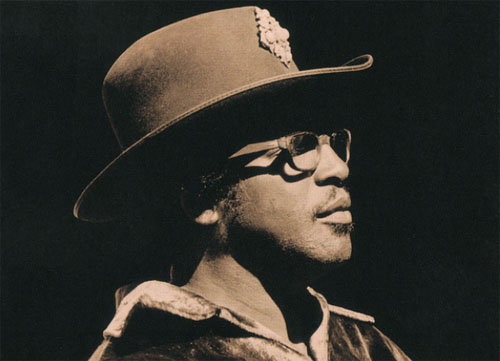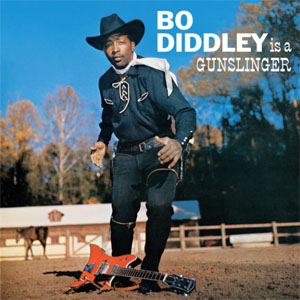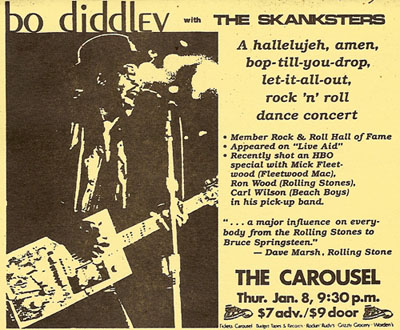
Bo Diddley, December 30, 1928 – June 2, 2008, RIP.
Photo courtesy Chess Records
By John Hoctor
June 7, 2008
As an inquisitive 7-year-old during the lazy crazy summer of 1962, two years before Beatlemania, seemingly out of nowhere, was unleashed upon our shores, I habitually would roam my Father’s giant depression-era 12-room Yonkers house alone, desperately trying to sneak a peek into the inner sanctum of my 14-year-old brother Richie’s alpha-male room. Amongst the many prized possessions? A nascent collection of “black records” including the unforgettable “Bo Diddley Is a Gunslinger” with the cigar-box-shaped guitar-toting wild man glaring menacingly back at me with Buddy Holly framed glasses and cocked-back cowboy hat, looking like some back-yard crawling king snake that in those days you’d beat with a broom.

Clearly, this wasn’t the safe schlock of the Shirelles or the mindless “Bobby singer-pop” of the month. I couldn’t have guessed that this album would change my life forever and that I would rendezvous from my Westchester County home, fast forward to my early 30s, and be hangin’ with the legendary ‘Slinger in Big Sky Country.
Some local townie greasers had given my brother “Big Rich” the LP gratis, possibly as a reward for being a tough guy after one wild teenage night of rage as a right of delinquent passage. The world of the Kennedy/Camelot era was certainly split between the black originators’ race records and rather waffling American Bandstand spoonfed white pop. America’s rich musical/cultural/racial merging would become mainstream, but original aboriginals like Diddley would scare the shit out of white Greatest Generation middle-class dads and moms like mine, with Nat King Cole on their transistors.
The world wasn’t running as fast as Diddley’s Roadrunner in terms of cultural acceptance and it probably still isn’t if the truth be known, even in an era of Obama ascendancies. Perhaps most Americans needed the simple jauntiness and peachy-faced innocence of the British Invasion to “reintroduce” New York-area suburban kids like me to the grit of 2120 S. Michigan Avenue, Chicago, Chess Records blues cum Delta “hambone” guitar pyrotechnics and rural “jungle” rhythms buried deep within the American musical mosaic.
Diddley, a Black Elvis and the ultimate tune weaver, sewed them all together with Buddy Holly and a host of rock dreamers into the ultimate synthesis of blues, street music, and what Alan Freed dubbed “rock and roll.”
Early last week, Diddley, born Otha Ellis Bates, aka Ellis McDaniel, succumbed after complications from a 2007 stroke to heart failure at 79, in Archer, Florida. Suddenly, the self-promoted rock and roll fantasy of my youth, wrapped in pure black bravado, was gone – wrapped instead in burial linen. Bo Diddley – a Gunslinger, “the Man” of his I’m A Man, Road Runner, Diddley Daddy, Mona’s Man, 500% More Man, and so many other self-bestowed monikers from the album covers of my youth – was silenced. Never again to bump and grind his way to and from the microphone with or without his singing partner, “the Duchess,” on an ax-shaped guitar playing backup.
As I read the AP headline reporting of his death, it hit me emotionally like a heart punch. It was like losing a long-separated sacred drinking buddy from a Kerouac novel. And drink we did in January 1987 in Missoula, Montana, at “the Carousel,” a cavernous, tacky, local rock palace of yore, where he appeared with a pickup group called the Skanksters, who were personal friends of mine and who played a perfect foil to the sometimes clown prince of rock and roll.Bo preferred a shot of Grand Marnier with the omnipresent green-bottled-Heineken chaser. “Pure class,” I thought. And it fit him to a T – so much so that I instantly got hooked myself. Libation imitation was the highest form of flattery I could give this – long time for me, but officially – soon-to-be rock and roll Hall of Famer who showed his appreciation with a wink and a nod I won’t forget anytime soon.It was “The Bo,” the Skanksters and I raving and raging as house guests at the Carousel bar while I was on assignment. Days before I interviewed him in Florida for an hour via phone from Missoula. But for two precious days, it was Gonzo journalism and our “lost weekend” of Marnier and Heinies for a preview “Entertainer” section cover piece for the Missoulian, the daily rag for Montana’s freewheeling mountain college town, Missoula.

But Diddley actually seemed bored when I asked him about the famed Chess Records days with label mates and founding fathers like Chuck Berry, Muddy Waters, Howlin’ Wolf, Willie Dixon, and many others. Repeatedly he said, “Yeah, that was great man but I never got paid.”
He was interested in hitting the road again and to re-engage in his newest projects and grandkids. Bo heard one of his 30-plus grandchildren stirring in the background and abruptly ended our chat yelling something back about going out for the day and having to wave me off like a gnat on a hot day with that deep rich baritone speaking voice.
“Hey man see you next week at the gig up there-I gotta go,” Bo said.
But with his passing last week together with my descent deep into middle age, you have to realize that the Diddley legacy has endured to the 21st century as rockers young and old can still hear the ever present “Bo Diddley beat,” a rhumba similar to the “hambone,” a style used by street performers in the 1950s and worked up today by gritty mid-American rockers like the Black Keys (Akron) or the White Strypes (Jack White/Motor City).
Thanks, Bo, for the memories, the music, and the on stage bump and grind performances. I wish I could buy you another Grand Marnier and a Heineken back and listen to your rolling, hearty laugh once again bounce around the walls of the cheesy place where you were booked for two days on your road show during that Montana winter over 20 years ago.
Just to be young again would be enough too.
Adio my friend, and one more for the road. Cheers and Rock on! ”
Your friend, John.


 The Hunger Site
The Hunger Site
No Comments
Comments for Montana Memories of Bo Diddley, A Gentleman and a Gunslinger are now closed.